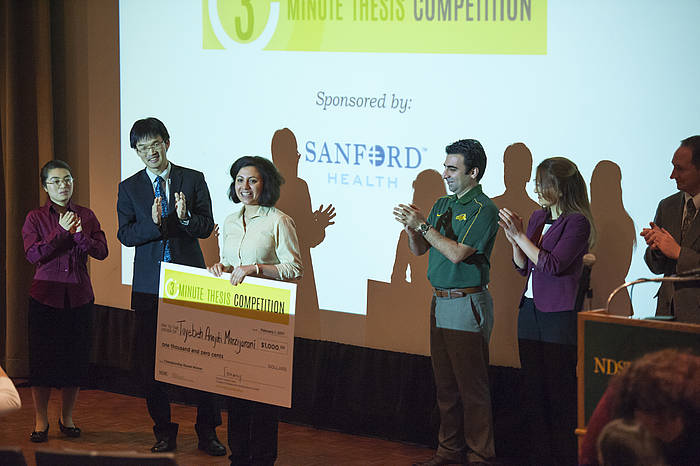
A graduate student studying cancer treatment gave the winning presentation at NDSU's Three Minute Thesis Competition, hosted Feb. 1 by the NDSU College of Graduate and Interdisciplinary Studies.
Tayebeh Anajafi Marzijarani, a doctoral student in pharmaceutical sciences, presented "Targeted Drug Delivery in Pancreatic Cancer” during the third annual competition, which was sponsored by Sanford Health. Her task was to explain her complex scientific research to a general audience in three minutes or less.
Marzijarani’s research examines chemotherapy delivery systems, looking for ways to target the treatment on cancer cells without being toxic to healthy cells.
“This represents four years of my research, and presenting all those years of work in just three minutes is really hard,” said Marzijarani, whose faculty adviser is Sanku Mallik, professor of pharmaceutical sciences. “But, this is really good practice, because it’s important to understand how to talk to people who are not from my major. There are different audiences, different backgrounds, and we should be able to explain scientific research in layman’s words so everyone can understand it.”
Her career goal is to work in a research laboratory at either a pharmaceutical company or university. “It doesn’t matter where I am or what country I am in, I would do my best to help improve human health,” she said.
Marzijarani earned $1,000 and will represent NDSU at the regional competition of the Western Association of Graduate Schools in Seattle. Finalists earned $250 for advancing from the competition’s eight preliminary rounds. Other students in the championship round included:
• Matthew Crouse, animal science, “Effects of Maternal Nutrition on Fructose, Glucose and Cationic Amino Acid Transporter Expression in Bovine Utero-placental Tissues from Days 16 to 50 of Gestation.” His faculty adviser is Joel Caton, professor of animal science.
• Farnaz Fouladi, pharmaceutical sciences, “The Role of the Gut Bacteria in Sustained Weight Loss after Gastric Bypass Surgery.” Fouladi’s adviser is Kristine Steffen, associate professor of pharmaceutical sciences.
• Masahiro Toyama, developmental science, “The Protective Power of Social Relationships in Late Life.” Toyama’s faculty adviser is Heather Fuller, assistant professor of human development and family science.
• Xiaoxia Li, industrial and manufacturing engineering, “A Semiparametric Trajectory Model for Cognitive Decline.” Her adviser is Canan Bilen-Green, vice provost for faculty and equity.
• J. Stanley, plant sciences, “Soybean Yield Gap in North Dakota.” His adviser is Hans Kandel, professor and Extension agronomist.
• Brian Schmidt, advanced athletic training, “Psychometric Evaluation of Two Self-Reported Questionnaires for Musculoskeletal Injuries among Musicians.” His adviser is Shannon David, assistant professor of health, nutrition and exercise sciences.
• Babak Jahani, mechanical engineering, “Development of an Advanced Composite Material Consisting of Iron Matrix Reinforced with Ultra High Temperature Ceramic Paticulate (TiB2) with Optimum Properties.” Jahani’s adviser is Fardad Azarmi, associate professor of mechanical engineering.
The competition began with 42 graduate students from a variety of disciplines competing in early rounds. Their objective was to quickly explain the objective and value of their groundbreaking research in terms relevant to government officials, media, future employers and funding organizations. A dissertation or thesis would typically take all day to present, but the competitors are given just 180 seconds to showcase their work.
“We have an impressive array of student research conducted at NDSU that fulfills our land-grant mission and positively impacts our state and nation,” said Brandy Randall, associate dean of the College of Graduate and Interdisciplinary Studies. “In addition, employers want new hires to communicate well, and this competition helps prepare students for the workplace by demonstrating that they can clearly present complicated ideas in a way that is both brief and interesting.”
Australia's University of Queensland developed the first Three Minute Thesis competition in 2008, and the concept has spread to institutions around the world. More than 350 universities in 27 countries now hold competitions.
As a student-focused, land-grant, research university, we serve our citizens.




